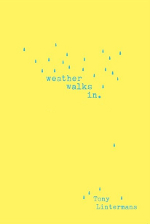
Weather Walks In by Tony Lintermans
Hybrid Publishers, 2013
I think of plainsong when I read Lintermans’s poems, of cadences unadorned by instrumentation but satisfying in their sound and rhythm. They are by no means Gregorian chants, but they still offer the calmness and sonority of such songs. This peacefulness begins with the physical appearance of the book. A yellow cover with blue type: the typeface like a manual typewriter. Apostrophes are rain drops. It’s a simple but effective design. Inside, the poems are laid out equally as simply and effectively. The acknowledgements show that quite a few of the poems have been published previously in various journals and one, ‘Self-portrait at sixty’, was the winner of the 2011 Peter Porter Poetry Prize. This poem gives the book its title. The poet answers a series of questions to himself. The fifth stanza reads:
When am I happy? In the sea, always, in the sea on a wave in the sea. When the backhand winner bludgeons doubt. When doors are open and weather walks in -- cumulus drama of women, cirrus blokes streaking the high days with laughter.
The poem is a subtle meditation, emblematic of many of the poems in the book. Lintermans plays with different forms but his style is overall reflective and meditative. Weather walks in, frequently, as it does in the first poem, ‘The evidence’, in contemplation of a calm sea that can rage so suddenly. The weather is also apparent in ‘First summery day’ where:
Bones begin to breathe something wakes up ignorant of clocks.
The ocean also makes an appearance in ‘We think we’re something’ when a neighbour’s brother has a heart attack while out fishing and drowns. ‘At Clydesdale’ evokes the ‘clean intoxication’ of rural landscapes while working life on the land is celebrated in ‘Four pieces for chainsaw’.
Other poems deal with the decline and death of aged parents and for me these are often the most affecting, or perhaps they say more to me from having experienced something very similar. In ‘For Jo from Sheffield’ the lines
Just the silverfish rustle, the ruthless curtain drop unloosing the dust motes dancing her mind to vacancy.
conjure up the terrible decay of dementia. ‘Dementia’s postcard’ and ‘Left’ offer further reflection on the death of a mother, as does the delightful ‘The copper stick’, which tells of a stick on a shelf once used to turn the washing in an old copper, but also used to punish and errant boy.
When mother died I wept, emptied and sold her house. The copper stick I kept.
There is also a poem about a father left without his wife (‘His wife’s death’) that catches the essence of grief in ‘meals/eaten alone.’ It is in such poems that Lintermans demonstrates his mastery of showing the emotional heart of the commonplace. However, there is a progression of poems in the book so that reading through them, the reader first observes a mother figure die, then a father alone, then the father die. Reflection follows in playful poems and some rueful ones as well:
Sometimes sex is like driving a tractor. You’ve gotta start the bloody thing then hold it tight, keep the lines straight.
These lines from ‘The farmer considers his marriage’ reveal the humour Lintermans frequently brings to his verse, even when he is considering the bleakest of topics. This provides a further dimension to his poetry, ensuring the reading of it is always a pleasure. A yellow cover with blue type; simple but effective, adequately reflecting the book’s contents.













